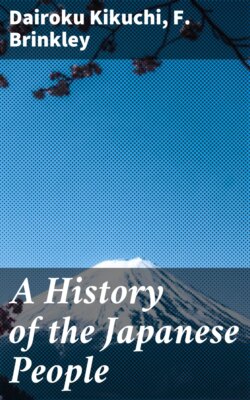Читать книгу A History of the Japanese People - Kikuchi Dairoku - Страница 114
На сайте Литреса книга снята с продажи.
THE SPHERE OF THE SOVEREIGN'S RULE
ОглавлениеIt is related in the Records that, in prehistoric days, the last of the chieftains sent by Amaterasu to wrest Japan from its then holders addressed the leaders of the latter in these terms, "The central land of reed plains owned (ushi-haku) by you is the country to be governed (shirasu) by my son." Japanese historiographers attach importance to the different words here used. Ushi-haku signifies "to hold in intimate lordship"—as one wears a garment—whereas shirasu means "to exercise public rights as head of a State." A Japanese Emperor occupied both positions towards mi-nashiro (q.v.), toward naturalized or conquered folks, towards mi-agata, miyake, and confiscated estates, but his functions with regard to the people and the land in general were limited to governing (shirasu).
If the ancient prerogatives of the sovereign be tabulated, they stand thus:
(1) to conduct the worship of the national deities as general head of all the uji;
(2) to declare war against foreign countries and to make peace with them, as representative of the uji, and (3) to establish or abolish uji, to nominate uji no Kami, and to adjudicate disputes between them. The first of these prerogatives remains unaltered to the present day. The second was partly delegated in medieval times to the military class, but has now been restored to the Throne. As for the third, its exercise is to-day limited to the office of the hereditary nobility, the Constitution having replaced the Crown in other respects.
Two thousand years have seen no change in the Emperor's function of officiating as the high priest of the nation. It was the sovereign who made offerings to the deities of heaven and earth at the great religious festivals. It was the sovereign who prayed for the aid of the gods when the country was confronted by any emergency or when the people suffered from pestilence. In short, though the powers of the Emperor over the land and the people were limited by the intervention of the uji, the whole nation was directly subservient to the Throne in matters relating to religion. From the earliest eras, too, war might not be declared without an Imperial rescript, and to the Emperor was reserved the duty of giving audience to foreign envoys and receiving tribute. By foreign countries, China and Korea were generally understood, but the Kumaso, the Yemishi, and the Sushen were also included in the category of aliens. It would seem that the obligation of serving the country in arms was universal, for in the reign of Sujin, when an oversea expedition was contemplated, the people were numbered according to their ages, and the routine of service was laid down. Contributions, too, had to be made, as is proved by the fact that a command of the same sovereign required the various districts to manufacture arms and store them in the shrines.
